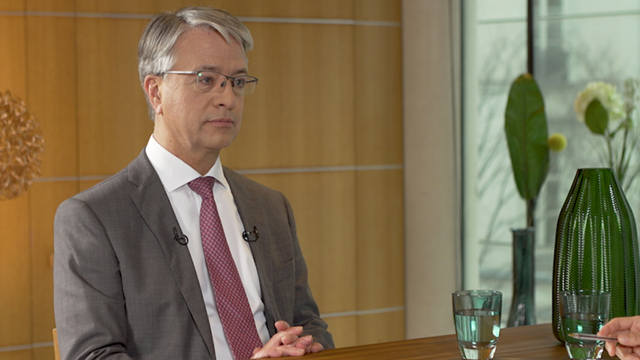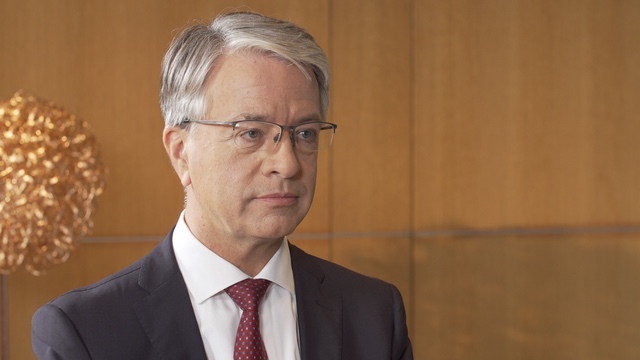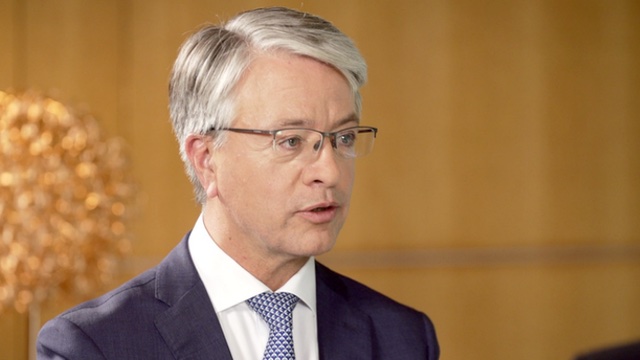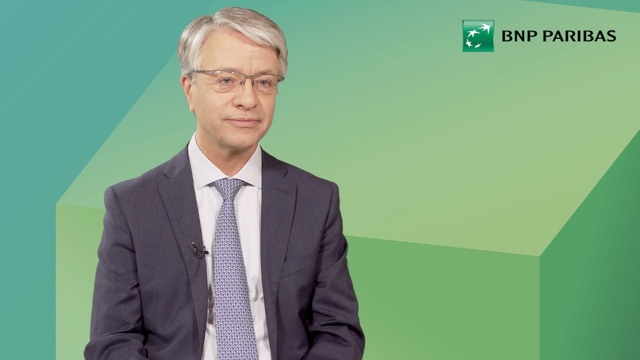EuroBusiness Media (EBM): Baudouin Prot welcome!
Baudouin Prot (BP): Thank you!
EBM: What are your comments on the group's performance in the second quarter?
BP: These results, generated in difficult market conditions, are a true reflection of the effectiveness of the Group’s diversified and client-centric business model in its new dimension.
Despite a high comparison base in the second quarter of 2009, but thanks to an increase in retail banking and asset gathering revenues, the Group’s top line was up 12 percent to 11.2 billion euros, and flat at constant scope.
A decline in operating expenses of 1.3 percent at constant scope combined with a further drop of 60 percent in the cost of risk at constant scope resulted in a pre-tax income of 3.7 billion euros.
All in all, BNP Paribas posted a net profit of 2.1 billion euros, a result commensurate with the Group’s new dimension and strong sales and marketing drive. The Group’s earnings per share grew by 25 percent to 3.6 euros.
Over the first half of 2010, return on equity reached 13.7 percent vs 11.8 percent in the same period in 2009, despite the impact of the shares issued last October.
EBM: What is your macroeconomic outlook, and what is your perspective on the current sovereign debt crisis? How well is the bank positioned to deal with such an environment?
BP: While still challenging, the macroeconomic environment is actually improving in most places where BNP Paribas operates which allows us for an increase in outstandings and a decrease in the cost of risk.
BNP Paribas is well positioned to overcome future challenges as a result of its business mix, its presence in wealthy and sound European markets and, last but not least, its stringent risk policy,
EBM: Your retail businesses demonstrated growth in terms of revenues and results again. What are the drivers of this growth and what is the outlook?
BP: In its Retail Businesses, BNP Paribas achieved strong and balanced revenue growth and more than doubled pre-tax income.
BNP Paribas’ growth is well rooted in very sound and wealthy domestic markets, namely France, Belgium, Italy and Luxembourg. Overall these markets exhibit sustained business levels, strong sales and very positive trends in both deposits and loans, particularly for mortgages that are of a low risk nature.
For Personal Finance, the good news this quarter is that the cost of risk has also started to decrease.
BancWest confirmed a return to significant profits while Europe-Mediterranean, with its attractive markets and good growth outlook, broke-even.
So globally the outlook for retail banking is positive with significant potential for market share gains.
EBM: Do you believe that the recent decline in the cost of risk is sustainable?
BP: The Group’s cost of risk at 1,1 billion euros, or 66 basis points of customer loans, was down 19% compared to the first quarter of 2010 and down 54% compared to the second quarter of 2009.
The second quarter of 2010 is now the fourth consecutive quarter where the cost of risk has declined for the Group, which is mainly due to an improvement in corporate health as well as improving conditions at BancWest and in Ukraine.
Due to a timelag effect, as SMEs follow corporates, in our domestic retail markets, we expect a stabilisation of the cost of risk with France and Belgium leading the way. In Italy, given the high number of small businesses, that are more fragile in difficult economic conditions, the cost of risk could still increase.
EBM: How well are you proceeding with the Fortis integration ? Do you think further cost and productivity gains are achievable beyond what you’ve already planed?
BP: The integration of Fortis is a major industrial project that involves almost all business units of BNP Paribas and brings a new dimension to each of them. The integration is being executed efficiently and swiftly as reflected in the numerous legal mergers that have already been completed across business lines and countries.
123 million euros of additional synergies were delivered and booked in the first half of 2010, which brings the cumulative full year effect to 402 million euros.
This is ahead of the schedule outlined in the integration plan. That said, and despite the good progress being made, it is too early, to revise the 2012 synergy targets.
EBM: After nearly 5 consecutive quarters of growth in CIB, the second quarter of this year marks a turning point. Would you say that this quarter is a ‘one-off’ or should we now expect to see slower growth in CIB going forward? In addition, what level of cost-income ratio do you believe to be sustainable for your CIB franchise?
BP: In extremely adverse market conditions, CIB managed to post 2.7 billion euros of revenues, which is 30% below the first quarter of 2010 that you may recall was exceptional in many respects.
Financing Businesses performed extremely well this quarter with steady growth in business activities, providing a very strong and recurrent revenue base for CIB, and record pre-tax income. Financing Businesses demonstrated their position as a world-class leader again.
As for Capital Markets, BNP Paribas was able to offer clients the hedging solutions they needed. But in an environment characterised by extreme volatility and very limited liquidity, the hedging cost of the positions was very high, in particular for Equity businesses.
We consider this quarter an achievement, not a turning point. On the contrary this is proof of CIB’s new dimension with its strong earnings capacity and its very resilient client-driven business model. We believe in its ability to perform well in more normalised markets.
As for Cost Income, beyond obvious quarterly seasonalities, CIB’s long term objective is still to remain below 60%.
EBM: In the current uncertain markets, where risk appetite is low, how do you think you can continue to grow your Investment Solutions division satisfyingly?
BP: In fact, the business mix of Investment Solutions that encompasses asset gathering, asset management, asset protection and asset administration provides resilience as illustrated throughout the crisis - with Investment Solutions never posting a negative quarter.
Indeed, in the last quarter, the decline of equity markets, a widening of credit spreads combined with extremely high volatility and very low short term interest rates do not create a favourable environment for businesses like Private Banking or Asset Management.
Nevertheless, Insurance benefits from low short term interest rates while BNP Paribas Securities Services benefits from the volatility of the markets.
EBM: Do you expect current bank funding costs to remain higher for the duration, or could we expect them to return to normal within a reasonable timeframe? If funding costs were to remain durably higher, how long would it take for you to reprice your assets?
BP: I would like first to highlight that, contrary to the post-Lehman crisis, the evolution of the bank’s funding costs has not been significant on short term tenors, not even in US dollars thanks to our strong dollar-based deposits. Today, short term liquidity is very abundant for BNP Paribas.
As for medium and long term funding costs, they have significantly increased following investors’ fears about some European Sovereigns. Nevertheless, these costs should return to normal, as they did in the second half of 2009, as investors’ concerns about the solvency of European banks lessen. In this respect, the European stress test results should contribute to lower these costs, as already illustrated by the decline in BNP Paribas’ CDS spreads - from 115 to 85 bp - over the past few days.
BNP Paribas funds long term assets with long term resources and our internal transfer pricing system updates, on a regular basis, the rates charged to our asset production teams according to the evolution of our cost of funding. This impacts the pricing of credits, right from their origination. We can therefore say that the current medium term funding costs have already been included, and our assets repriced in parallel.
EBM: Now that the Basel 3 requirements have been significantly watered down, do you feel that it will be necessary or unnecessary to evolve your business model going forward, notably with respect to revenues generated from asset-liability mismatch management?
BP: I would not qualify the last set of proposals of the Basel committee as watered down but rather as technically improved.
It is neither in the interest of better financial stability, which we fully support at BNP Paribas, nor in the interest of financing the economy, to which we are very committed to require excessive layers of capital or liquidity without risk-based justification.
Although the latest package has improved compared with the first one, there is still significant work to be done to get to the right technical package and the calibrations still need to be fine-tuned.
Last but not least, I would like to stress that excessive importance should not be granted to ratios when what is key is the quality of the supervision.
EBM: What will be the impact of the US banking reforms for BNP Paribas, both for your derivatives business and for your domestic US bank, BancWest ?
BP: The two thousand page US Dodd-Frank Wall street reform gives a lot of leeway to the US regulators at the implementation stage.
Americans themselves say it will take them time to draft and circulate the bills.
It is therefore too early to answer your question.
EBM: What are your comments on the recent stress tests for the banking sector in general and, regarding BNP Paribas in particular, what color can you give us, today, regarding how well your bank stood up under the tests?
BP: The publication of the stress tests is a clear move from European regulators to provide transparency to the market.
These tests, based on severe economic and capital markets downgrade scenarii, demonstrate that most European Banks are strong and well capitalised. Some emerged as particularly solid and BNP Paribas, with a capital buffer of 25 billion euros, the fourth highest, is certainly one of them, which did not come as a surprise.
This will, hopefully, put an end to worries related to the health of the European banking system as a whole.
EBM: Baudouin Prot, CEO of BNP Paribas, thank you very much!
Baudouin Prot: You’re welcome!






